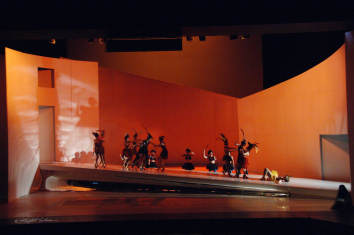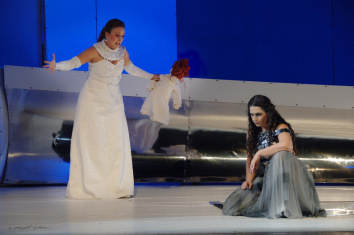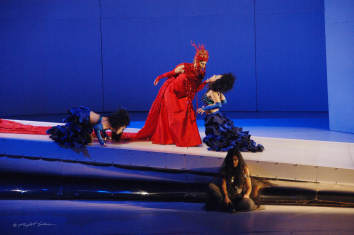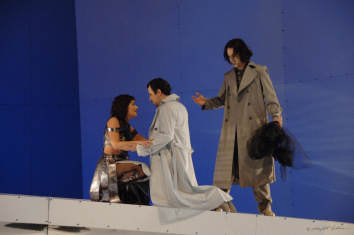|
Editorial Board
Melanie Eskenazi Webmaster:
Bill
Kenny
|
Seen and Heard International
Opera Review
Amidst the profusion of surface details
that marks Strauss’s dramatic, leitmotivic, and rapidly
shifting tonal language, this production manages to bring
out the powerful, underlying psychological shape of the
work.
The moment in which Elektra falls to the stage after Aegisth
has been disposed of-her vengeful mission completed-has
the effect of a true epiphany, an enormous release of
over ninety minutes of tension leading up to that point.
If the Gala opening’s Elektra (Sema Tüzün) was effective
in this respect, Saturday’s pre-opener with Jaklin Çarkçı
was utterly convincing. Ms. Çarkçı’s acting,
timing and expressiveness in the role was superb. Taken
together with a very solid, well-intoned vocal performance
(in which the sometime mezzo wisely took a few high notes
down an octave), her character--who, one realizes at the
end of the two hours, has been onstage the entire time—elicited
genuine emotion and sympathy. This is by no means
a given in this murderous role. Ms. Çarkçı
is a shade softer than some other Elektras have been,
but the more effective because of it. Ayse Sezerman, as the more domestically
minded Chrysothemis in the Gala performance, was superb,
her voice more than equal to what is perhaps vocally the
most difficult part in the work, although any dramatic
reaction to the lesbian-like advances of her sister were
non-existent. Lynn T. Çaglar was a superbly convincing
Klytämnestra, most especially in her initial entrance,
where the sense of incestuous horror and dementia so important
for the work found its vocal manifestation most palpably
in Ms. Çaglar’s venomous, slow portamento and deliciously
spat-out German consonants. While powerful
in voice, and not lacking in pronunciation, Önay Günay
as Orestes somehow was unable to give the character quite
the presence its Wagneresque musical setting demands,
possibly because of his seeming refusal to really sustain
tones, coupled with a tendency towards overacting. On
the other hand, after a shaky opening Saturday, in Tuesday’s
Gala the maids in the opening scene, led by Arzu Bozkürt
and Yeliz Çelikkol, were clear, in tune, and incisive
in their German pronunciation. In supporting the broad, quasi arch-form
of Strauss’s music and Hoffmannsthal’s unmatched long-range
dramatic crescendo, the staging of Aytaç Manizade is simple
and effective. Elektra’s stillness at the beginning sets
up consequent picturesque, refreshing shifts in use of
the horizontal and up-and-downstage dimensions of the
luminous, well-proportioned staging area (Öncel Kandemir).
The timing, directness and speed of the background entrances
of Klytämnestra's stilettoed attendants and blue-robed
priests marching through on the way to sacrifice, as Chrysothemis
pleads to Elektra to flee, is quite powerful. The
kinkiness of Klytämnestra's trainbearers' and maids’ costumes
(Aysegül Alev) fittingly emphasize the devolution of sexual
impulses through derangement into violence-a significant
aspect of Hoffmannsthal’s libretto, borne out by the nihilism
of Strauss’s polychords, teetering tonality and his bizarre
inclusion of waltzes within such a context.
If Elektra has ‘unsexed’ herself to revenge her father,
as commentators have written (“I’m feeding a vulture in
my body”) then Klytämnestra, Aegisth and her palace are
sexuality perversified. While every moment
was not equally effective dramatically (surface violence
tended to be utterly unrealistic), the large picture was
well reinforced with appropriate symbols—allowing one
to absorb better the genius of Strauss and Hofmannsthal’s
large-scale formal sense. The orchestra’s role in
building up climaxes in the sacrifice scene and through
the entire sequence with Orestes is crucial to this, and
these were powerfully realized under the direction of
conductor Alexandru Samoila. Indeed, the orchestra
played the performance of its life.
Pictures © Istanbul State Opera
Back to the Top Back to the Index Page |
| ||
|
||||






